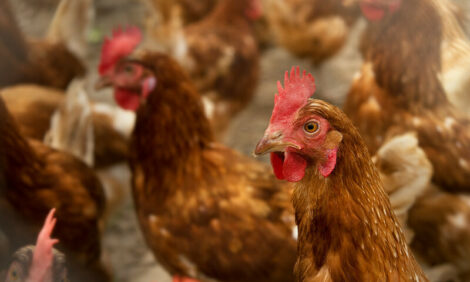



Ag Ministry Blamed for Arsenic-Tainted Chicken Sales
ISRAEL - It is alleged that the Agriculture Ministry allowed the sale of poultry meat with a high residue of arsenic between 2003 and 2006.Haaretz reports that, from 2003 to 2006, a growth stimulant containing arsenic was fed to chickens and pigs raised in Israel. The publication cites a report issued on 6 May by State Comptroller, Micha Lindenstrauss.
This happened with the knowledge of the Agriculture Ministry, the report said, and it harshly criticises the Agriculture Ministry and other government authorities, including the health and education systems, police and transportation authorities.
According to the report, arsenic residue, which can accumulate in the liver and fatty tissue, was found in 2005 and 2006 in Israeli chickens raised as meat to be sold to consumers. Even in small quantities, arsenic can cause cardiac and circulatory problems in addition to cancer, digestive problems and a decline in mental function.
Arsenic can also pose major environmental hazards if arsenic dust washes into water reservoirs. Substances containing arsenic are no longer used in the United States because of the risk of exposure.
According to the comptroller's report, at the end of 2003, the Agriculture Ministry permitted chicken and pork farmers to use the growth stimulant that contains arsenic, despite a ban on arsenic-containing chemicals and hormones in Israel since 1959.
In October 2006, when it became clear to the Agriculture Ministry – then headed by Yisrael Katz, now transportation minister – that chicken farmers were using the additive, it failed to act immediately to ban the substance.
"The ministry favoured the position of the farmers, who had economic considerations in mind, and did not consider the environmental damage and the public interest," the comptroller wrote.
The additive was only banned in April 2007, meaning that for at least four years, some people consumed chicken containing arsenic. Symptoms of arsenic poisoning include diarrhoea, nausea, vomiting, a dramatic drop in body temperature and a bluish colour in parts of the body. Severe cases can lead to death.
Haaretz reports that some 700 chicken farms in Israel produce 400,000 tons of chicken meat a year. Israelis are among the largest per-capita consumers of chicken in the world. Industry sources say that between 2003 and 2006, only chickens raised for meat consumption received the arsenic-containing additive. It was not fed to chickens raised for egg production.
Poultry farmers said the additive was approved by the Agriculture Ministry and that they stopped using it as soon as they received instructions to do so. One chicken farmer from the Galilee said he was never told that the feed contained arsenic.
"We knew they put all kinds of additives in the feed, especially against diseases and to induce fast growth, because the faster the chicken grows the cheaper the production costs," he told Haaretz. "You always want to send them to slaughter as fast as possible and start on new chickens. But this is the first time I'm hearing of arsenic."











